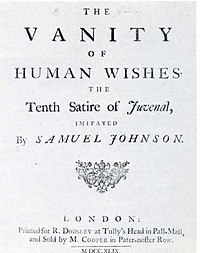Our website is made possible by displaying online advertisements to our visitors.
Please consider supporting us by disabling your ad blocker.
The Vanity of Human Wishes

The Vanity of Human Wishes: The Tenth Satire of Juvenal Imitated is a poem by the English author Samuel Johnson.[1] It was written in late 1748 and published in 1749 (see 1749 in poetry).[2] It was begun and completed while Johnson was busy writing A Dictionary of the English Language and it was the first published work to include Johnson's name on the title page.
As the subtitle suggests, it is an imitation of Satire X by the Latin poet Juvenal. Unlike Juvenal, Johnson attempts to sympathize with his poetic subjects. Also, the poem focuses on human futility and humanity's quest after greatness like Juvenal but concludes that Christian values are important to living properly. It was Johnson's second imitation of Juvenal (the first being his 1738 poem London). Unlike London, The Vanity of Human Wishes emphasizes philosophy over politics. The poem was not a financial success, but later critics, including Walter Scott and T. S. Eliot, considered it to be Johnson's greatest poem.[3] Howard D. Weinbrot called it "one of the great poems in the English language".[4]
Previous Page Next Page


